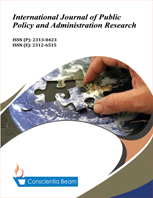Transforming participatory budgeting through dialogic accounting in Indonesia
DOI:
https://doi.org/10.18488/74.v12i1.4153Abstract
This study aims to develop a budget participation dialogue model that enables collaboration between the government and the community in redefining their understanding of participatory budgeting (PB) activities. The approach used is a qualitative methodology that emphasizes observation of the dialogue process. Data were collected from 40 informants from five regions in South Sulawesi Province, including village communities, community leaders, and government staff, including heads of regional work units. The results of the study indicate that inequality in the PB dialogue needs to be balanced with values derived from South Sulawesi culture, such as the principle of equality. In addition, the principle of justice can also be developed in the dialogue at the musrenbang communication forum by placing stakeholders as the main party and ensuring that the budget focuses on community welfare. This study concludes that the application of the principles of equality and justice in the PB dialogue can create a government that is more responsive to community needs. The practical implication of this finding is that by integrating local values in budget planning, the government can strengthen social relations with the community.

